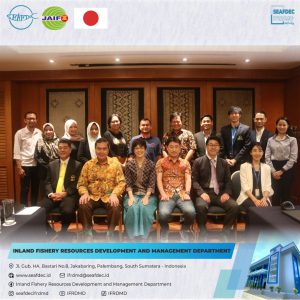SEAFDEC Workshop Advances Sustainable Management of Tropical Anguillid Eel Resources
 SEAFDEC, in collaboration with the JAIF-supported project, hosted the Training Workshop on CPUE Analysis and Stock Assessment from January 10 to 13, 2025, in Jakarta. This workshop is part of the project “Development of Stock Assessment Methods and Strengthening of Resource Management Measures for Tropical Anguillid Eel in Southeast Asia.”
SEAFDEC, in collaboration with the JAIF-supported project, hosted the Training Workshop on CPUE Analysis and Stock Assessment from January 10 to 13, 2025, in Jakarta. This workshop is part of the project “Development of Stock Assessment Methods and Strengthening of Resource Management Measures for Tropical Anguillid Eel in Southeast Asia.”
Tropical anguillid eel resources play a significant role in global fisheries, serving as a source of consumption and international trade. In Southeast Asia, the rising demand for these resources has heightened the need for sustainable management. However, efforts to develop effective management measures have been hindered by a lack of comprehensive information on eel biology, catch data, and aquaculture practices. The workshop addressed these challenges by reviewing and analyzing sample catch data, environmental data, and CPUE (Catch Per Unit Effort). It also discussed methods for estimating abundance trends and developing appropriate management measures. Additionally, the workshop aimed to update regional policy guidelines to support the conservation and sustainable management of tropical anguillid eel resources.
Key outcomes of the workshop were the development of improved methods for estimating stock abundance trends and the drafting of updated policy guidelines for regional conservation efforts. Participants included SEAFDEC staff involved in fisheries management and tropical eel research, representatives from the Malaysian Department of Fisheries, ASEAN, JANUS, and eel fishery practitioners from Central Sulawesi, as well as SEAFDEC/IFRDMD. The trainers were Prof. Toshihide Kitakado, Ph.D. from Tokyo University of Marine Science and Technology, with additional insights from Prof. Satoshi Ishikawa, Ph.D
. of Kyoto Prefectural University.
Dr. Tomoko Nakazato, SEAFDEC Deputy Secretary-General, opened the event with her welcome remarks. The workshop agenda included presentations on an overview of tropical anguillid eel resources, the standardization of CPUE data collection, abundance estimation, and eel resource stock assessment. Participants were actively engaged in practical sessions on data analysis through hands-on computer lab work. Additionally, experts explored various methodologies, including generalized de Lury methods and sampling techniques, to assess eel abundance. These sessions were complemented by practical exercises to ensure participants could effectively apply the strategies.
Further insights were provided through presentations on additional research topics, such as area-capability enhancement in eel fishery management by Prof. Ishikawa, case studies from Myanmar by Mr. Iwao Fujii from JANUS, and insights into the anguillid eel fisheries in Sulawesi by Mr. Handri.
On the final day, participants revisited and updated the manual established in JAIF Phase 1 and discussed plans for tropical anguillid eel resource management. These sessions aimed to consolidate the knowledge gained during the workshop and to outline actionable strategies for advancing sustainable fisheries management in the region.
The workshop concluded with a closing remark delivered by the Chief of SEAFDEC/IFRDMD, Mr. Andi Soesmono. He thanked all participants, resource persons, and organizers for their active involvement and valuable contributions. He also expressed his heartfelt hope that all participants would arrive safely in their respective countries and homes, carrying with them valuable knowledge and renewed enthusiasm to advance sustainable anguillid eel fisheries management.
